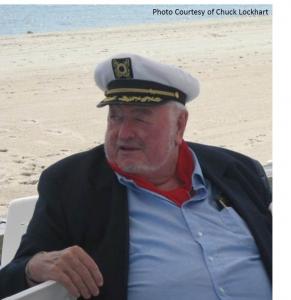Morris Johnson

Cape Cod Shellfish Industry Interviews
This is a collection of 15 interviews conducted in 2007 with people on Cape Cod who are involved in the shellfishing industry. Five people who are employed by towns to manage and regulate shellfish (Shellfish Officers), seven people who own shellfish aquaculture businesses (Growers), and four people who harvest wild shellfish commercially (Commercial Harvesters) were asked the question “What does shellfishing mean to you?”. From that starting point, questions centered on how the individual got into shellfishing and then what they thought the future of shellfishing might be.
The interviews were conducted by Sandy Macfarlane, a retired shellfish biologist and conservation administrator for the town of Orleans. The work was done under a contract with the Barnstable County Cooperative Extension Marine Program. Each interview is summarized into a written document that varies from 807 to 1557 words long and has an accompanying photograph. The interviews represent geographic, age, gender, and experience diversity as well as shellfish species diversity. All interviewees are year round residents of Cape Cod. One theme that emerged from this work is that shellfishing remains an important component of the Cape Cod economy and culture and those who are involved are concerned about its continued presence.
In 2007, Morris was the shellfish warden for the Town of Yarmouth and has established himself as a prominent figure in the field of natural resource management, particularly within the context of marine environments. His career trajectory has been marked by a series of progressive roles that have seen him evolve from a hands-on practitioner to a strategic leader in the conservation and sustainable use of shellfish resources. Johnson has gained a reputation for his innovative approaches to enhancing shellfish populations. Johnson's work has often placed him at the intersection of community interests, economic imperatives, and environmental stewardship. His efforts have not only contributed to the preservation of shellfish populations but have also played a crucial role in maintaining the cultural heritage associated with shellfishing in his community.
Scope and Content Note:
The interview with Morris Johnson provides an in-depth look into the intricacies of shellfishing on Cape Cod, highlighting its significance to both the local economy and cultural identity. Johnson, serving as the Director of the Natural Resources Department, brings a wealth of experience and knowledge to the discussion, offering insights into the various strategies employed to bolster shellfish populations. He discusses being involved in fishing and shellfishing as a boy growing up on Cape Cod, getting his Coast Guard license, and working towing barges. He became the first Natural Resources Officer for the Town of Yarmouth and discusses the department he inherited, how he grew and changed it, how he hired people and enforced the regulations, and how he managed the shellfish resources. He discusses modifying areas using a hydraulic dredge to improve the growth of shellfish. He discusses changes in attitudes about shellfishing and an incident involving conflicts with wealthy people and shoreline use. He also discusses his efforts to educate the town's selectmen about the value of shellfish resources and his experiments with different propagation techniques. Throughout the interview, he articulates the challenges that have emerged over the years, reflecting on the industry's evolution and the environmental pressures it faces. His narrative underscores the importance of innovative management practices, the willingness to experiment, and the role of education in ensuring the sustainability of shellfish resources. Johnson's testimony is a blend of personal anecdotes and professional evaluations, providing a unique perspective on the state of shellfishing in the region. He delves into the unconventional methods he has championed, the successes and setbacks encountered, and the lessons learned in the process. The interview is rich with details about the hands-on efforts to protect and preserve the shellfish industry, as well as the broader implications for community livelihoods and traditions. Johnson's emphasis on the need for adaptive management reflects a deep understanding of the dynamic nature of natural resource conservation.
Please Note: The oral histories in this collection are protected by copyright and have been created for educational, research and personal use as described by the Fair Use Doctrine in the U.S. Copyright law. Please reach out Voices@noaa.gov to let us know how these interviews are being used in your research, project, exhibit, etc. The Voices staff can help provide other useful resources related to your inquiry.
The NOAA mission is to understand and predict changes in climate, weather, oceans, and coasts, to share that knowledge and information with others, and to conserve and manage coastal and marine ecosystems and resources. The Voices Oral History Archives offers public access to a wide range of accounts, including historical materials that are products of their particular times, and may contain offensive language or negative stereotypes.
Voices Oral History Archives does not verify the accuracy of materials submitted to us. The opinions expressed in the interviews are those of the interviewee only. The interviews here have been made available to the public only after the interviewer has confirmed that they have obtained consent.
